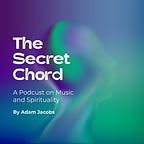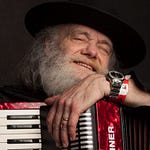Transcript
Hello and welcome to the Secret Chord Podcast. My name is Adam Jacobs. The Secret Chord explores spirituality through the lens of great music. Each episode explores a new artist and unpacks some of the hidden spiritual richness of the music and lyrics. Thanks for joining me. Let's listen.
Hello all and welcome to episode 52 of the Secret Chord Podcast. Today I'd like to look at one concept from three very different musical and thematic perspectives. Our topic is the City of Jerusalem. We'll touch on its significance and see that it has represented some pretty significant things to quite a lot of people for a very long time. Poets, artists, and musicians have tried to capture its essence and armies have fought over it time and again for thousands of years. Just what is all the fuss about? That's our question, and we'll have three great artists to try to answer it.
Let's leap right in with one of my all-time favorite bands, Emerson Lake and Palmer, known as ELP. They were an English progressive rock supergroup formed in London in April of 1970. The band consisted of Keith Emerson on keyboards, Greg Lake on vocals and bass, and Carl Palmer on drums and percussion with nine certified gold record albums in the US and an estimated 48 million records sold worldwide. They were one of the most popular and commercially successful progressive rock bands of the 1970s with a musical sound including adaptations of Classical music with Jazz and symphonic rock elements dominated by Emerson's flamboyant use of the Hammond organ, (which I've seen live, it's amazing) also the Moog Synthesizer and piano.
So this tune is off their 1973 album Brain Salad Surgery. This is Jerusalem by the great ELP.
That is a fantastic song. Now the lyrics of the song were originally written by the poet William Blake and were then turned into a hymn by Sir Hubert Perry, who was asked by then poet laureate of England, Robert Bridges, to compose something inspirational, since in 1916, morale had begun to decline because of the high number of casualties in World War I and the perception that there was no end in sight.
Upon hearing it, he said that it was an appropriate hymn text to brace the spirit of the nation to accept with cheerfulness all the sacrifices necessary. In time, the tune became the unofficial national anthem of the UK. When ELP got their hands on it and created their own distinctive progressive rock version, not everybody was pleased. The BBC actually banded as offensive and the song failed to chart as it got no airtime, which is a pity since it’s a masterpiece.
Musically, the track features the debut of the prototype Moog Apollo, the first-ever polyphonic musical synthesizer. Keith Emerson is one of the best keyboard players in rock history, and you can hear his skill and creativity throughout the tune. Greg Lake's vocals are fantastic here, strong moving, and expressive, and though it doesn't showcase him as much as some of the other songs, Carl Palmer is an extremely talented drummer and his bold and aggressive playing rounds things out well here.
In the lyrics, they say, “Bring me my bow of burning gold. Bring me my arrows of desire. Bring me my spear. Oh clouds unfold. Bring me my chariot of fire.” This, by the way, is all biblical imagery, specifically from the second book of Kings 2:11 and 6:17 in case you were wondering. Just one thing to note, this is not tongue-in-cheek. These are reverential quotes and they underscore the weightiness that the writers wanted to convey—that of divine assistance in dark times for the English, A light that is believed to shine forth from the earthly seed of goodness and holiness, Jerusalem.
They go on to sing, “I will not cease from mental fight, nor shall my sword sleep in my hand till we have built Jerusalem in England's green and pleasant land.” To me, this is a remarkable phrase. The goal is not to build an Athens or Rome or anything else. How unexpected and how instructive it is to think that the unofficial national anthem of the British Empire states as its highest goal to build Jerusalem in “England's green and pleasant land.”
Let's move on to another example. As it happens, I'm planning on doing a whole episode on this band next time, so I'm not going to go into too much detail about them. Just now, suffice it to say that U2 are one of the longest-lasting, most successful bands in the history of rock and roll who burst onto the scene in the early 1980s and have cranked out consistently solid music ever since, as we'll discuss more next time. They are a very spiritual group and write about many religious ideas. As such, we might've expected them to sing about Jerusalem as well, which they did. This is off their 1981 album, October. This is (With a Shout) Jerusalem by the great U2.
And another beautiful amazing tune about Jerusalem. This is the famous U2 sound. The classic rock backbeat with the excellent textured heavy effect, but tasteful guitar work of The Edge and Bono's piercing and evocative vocals. He sings “I want to go to the foot of Mount Zion, to the foot of He who made me see, to the side of a hill. Blood was spilled. We were filled with a love.”
This is heady stuff. A lot of bands can't pull off poignant lyrics, but they have always done it very well, even from their early days. So whereas ELP’s Jerusalem emphasized the lights of the city, U2’s is focused on its love.
There's a story that's told about Jerusalem's ultimate origins that of two brothers, one who had a large family and the other who had none. One night, the brother without a family realized that his brother with a large family might need more food. And so he took some of his crops and in the middle of the night snuck over and deposited them by the home of his brother. And the other brother with a large family had a similar idea and he said, gosh, my brother has no family. The least I can do for him is to bring him some of my crops and to bring them to him.
And so he did the same thing on a different night. He snuck over and he deposited the food, which he didn't realize that his brother had already brought him back to his brother's home. And this went on night after night, each brother trying to help the other with the produce that he had. And one night in the middle of the darkness in a field, they met and realized what had been going on. And in that moment they embraced and God said, “That's the place that I want to build my temple.” In the heart of a place that would eventually be called Jerusalem. Where there is true giving and brotherly love.
Jerusalem was won in a military conflict when King David defeated the Jebusites. During its long history, it has been attacked 52 times, captured and recaptured 44 times, besieged 23 times, and destroyed twice. It is today one of the oldest cities in the world. The name Jerusalem actually means city of peace from the word “Salem” Shalom, which is somewhat ironic. So if Jerusalem is all about love and light, then why does there always seem to be so much strife and pain there? Well, as they say, it's complicated. Oftentimes there's a lot of bad that swirls around things that are very good, the bad dislikes the light, so to speak, and is always trying to diminish it to jealously, disallow for others what it cannot have for itself.
There's a kabbalistic idea that there is a hard layer of spiritual opposition called a husk or a shell that surrounds all good things, which are in this case described as sparks. In order to reach and free these sparks of light, these shells must first be broken through a process that is not always easy or pleasant. Good things are, for better or worse, acquired through a certain degree of pain. And Jerusalem, the place that originated most of what we in the Western world regard as good today is no exception. Some want to control the light for nefarious purposes and some just want to destroy it. The net result is the contradictions and the conflict that have been raging there for so long.
Now of all the songs on this topic, I have to tip my hat to our last artist for today who took it farther and deeper than any of the other artists that I'm familiar with. Lauryn Hill is widely considered to be one of the greatest rappers of all time and has been called the greatest female rapper. Consequence of Sound named her one of the 100 greatest singers of all time. Music critic Brandon Tensely wrote, “Few artists have marked culture as profoundly as Hill did with her solo debut.” She was included on NPR's list of the 50 Greatest Voices. Lauryn has won numerous accolades throughout her career, including eight Grammy awards, five MTV Video Music Awards, four NAACP Image Awards, including a President's Award, and four Guinness Book of World Records.
This is from a 2002 MTV Unplugged album. This is “O Jerusalem” by the great Lauryn Hill:
What an amazing performance. Just her raspy honest voice with her own vampy guitar accompaniment. The melody is fantastic and highly original. You get the sense that this style of performance is getting down to her essence—this is really her, unvarnished and just putting it all out there. She’s called a rapper but she’s also often referred to as “neo-soul”—a style of music that emerged from soul and contemporary R&B. Heavily based in soul music, neo-soul is distinguished by a less conventional sound than its contemporary R&B counterpart, with incorporated elements ranging from funk, jazz fusion, hip hop, and African music to pop, rock, and electronic music.
AllMusic gave this album 4 out of 5 stars, saying that the recording "Is the unfinished, unflinching presentation of ideas and of a person. It may not be a proper follow-up to her first album, but it is fascinating."
There are so many ideas worth exploring from this but given the 8-minute (and 8 verses) scope of the song we’ll have to whittle it down to just a few.
Failing to connect cause I'm morally defect
By reason of the God inside my head
Causing me to see only what pertains to me
Believing I'm alive when I'm still dead
Well, that basically sums up the whole problem. Moral defect is a direct outgrowth of a fixation on ourselves - death is the relentless focus on “I” while life, morality, and goodness is focused on “we.” It’s as simple as that - and as hard as that. This is the issue as individuals, for cities, and for nations. And if you feel inspired to read a great book on the topic check out Jonathan Sack’s “Morality” which chronicles about a dozen different ways in which we have gone in reverse over the course of several decades and what the social, psychological, and spiritual implications are.
The chorus goes to personify Jerusalem and hope for her improvement:
Oh Jerusalem, wash thy heart from wickedness
That thou mayest be saved from thy deception
How long shall thy faith lodge lies within thee?
Oh Jerusalem, keeping thee from perfection
So again, whether it's on a personal or collective level, there is no more critical spiritual and moral concern than as she says to “wash thy heart from wickedness” - essentially to move from I-centric thinking to we-centric. And, as we see, one of the universal metaphors (at least in the Western World) that we have for the light, love, and ultimately, perfection in this regard has been (and probably always will be) the Holy City of Jerusalem.













